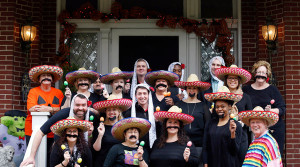
James Ramsey, lower right, the University of Louisville president, and his wife, Jane, upper left, hosted a Halloween party in Louisville, Ky. The University has apologized for the photo showing Ramsey among university staff members dressed in stereotypical Mexican costumes. Scott Utterback/The Courier-Journal, via AP
There have been recently in the US media a rash of reports related to what is often called cultural appropriation, namely taking on superficial aspects of another culture (appearance, dress, speech) in a way that can be perceived as prejudicial and insensitive. Today, there was a story out of Yale University, which, as other US universities did for Halloween, issued guidelines for avoiding cultural insensitivity in choosing a Halloween costume – eliminating what used to be mainstays of Halloween costumes such as Native American princesses (Pocohontas) or a Chinese warrior princess (Mulan). At Yale, an email was sent out to all students outlining what kinds of costumes are inappropriate. One of the categories was “Socio-economic strata”, which would have eliminated my stand-by Halloween costume as a kid, a hobo, a term which, too, has become unacceptable. The email sent out to Yale students by the “Intercultural Affairs Committee” prompted a response by one faculty member, Erika Christakis, who commented in an email of her own:
This year, we seem afraid that college students are unable to decide how to dress themselves on Halloween. I don’t wish to trivialize genuine concerns about cultural and personal representation, and other challenges to our lived experience in a plural community. I know that many decent people have proposed guidelines on Halloween costumes from a spirit of avoiding hurt and offense. I laud those goals, in theory, as most of us do. But in practice, I wonder if we should reflect more transparently, as a community, on the consequences of an institutional (bureaucratic and administrative) exercise of implied control over college students.
The idea, advocated here, for Yale students to decide issues of appropriateness of costumes for themselves, was met with a storm of protest from Yale students, with one encounter (with Christakis’ husband, also a faculty member) being captured on video. The Atlantic today has a long article about the controversy. One of the points made there is that the students’ strong reaction to Christakis’ email was likely not just caused by the email, but came from feelings of many minority students at Yale that racism was prevalent on campus. A NY Times article details some recent incidents.
The tension between free speech and cultural insensitivity is something that many US universities have struggled with, for example in creating “speech codes” which limit certain kinds of speech. It’s not just college campuses either. The NY times ran a piece recently on fashion asking “Does anyone own the cornrow?”, a hair style associated with black women, but one that has become popular with young white women as well. The case of Rachel Dolezal (the white woman who until recently claimed to be black) also has raised interesting questions of identity formation – is it offensive for someone to try to look black because she feels black and identifies more with African-Americans?